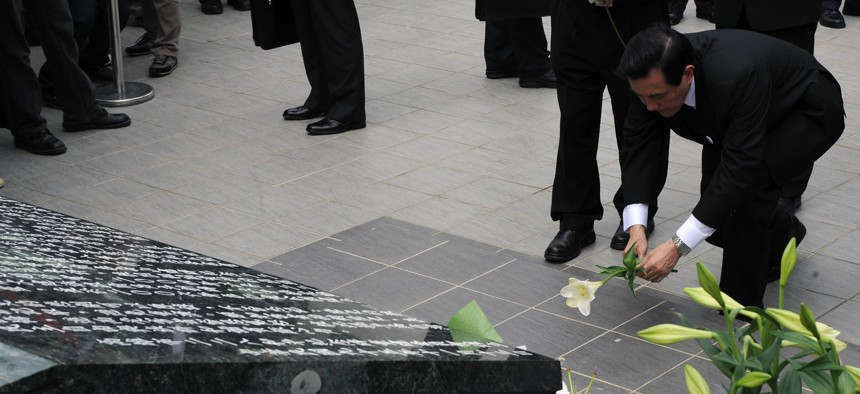Making an apology

Taiwan's then-President Ma Ying-jeou places a flower in front of a monument during the 2009 commemoration of the anniversary of a massacre perpetrated by Kuomintang forces. Sam Yeh/AFP via Getty Images
On a trip to Taiwan, Steve Kelman reflects on the importance of apologies.
I am visiting Taiwan and had an interesting chance to have a conversation with the head of the international department of Taiwan’s KMT party, which for many years ruled Taiwan under dictator Chiang Kai-shek and is now the country’s opposition party. I wanted to talk with him about how it had happened that this party, which once epitomized hatred of Communism, had now developed friendly relations with China and sent delegations, including ones he participated in, to the country. But something he said sort of in passing caught my attention. It started when he said, "Of course, Chiang Kai-shek was a dictator," an interesting statement by itself. And then he added, "I apologize for the human rights violations by the KMT."
I was taken aback enough by this statement that I did a Google search, and discovered that President Ma Ying-jeou had actually made a similar statement. Speaking in 2012 at the inauguration of a memorial hall to honor an imprisoned political activist, the leader and then-KMT head said the party owed the activist an apology. "I offer my apology to let people know that the government is willing to face history and correct past mistakes with honesty," including paying compensation to victims.
It turns out this wasn’t the only Taiwanese apology (not bad for a people who have more often suffered than caused suffering). In 2016 the Taiwan president offered an apology to Taiwan’s aboriginal peoples. "On behalf of the government, I express to you our deepest apology for the four centuries of pain and mistreatment you have endured, I apologize to you on behalf of the government."
Apologizing to indigenous people has also been raised in Australia. When first discussed, the conservative prime minister rejected apologizing. With the election of a Labor Party government, the policy changed. The government stated, "We apologise for the laws and policies of successive Parliaments and governments that have inflicted profound grief, suffering and loss on these our fellow Australians."
The U.S. Congress passed a law in 2013 apologizing to Japanese-Americans for their internment during World War II, and gave each surviving internee $20,000 compensation. In the 2009 national defense authorization bill there was language, of which the lead sponsor was Kansas Republican Sen. Sam Brownback, apologizing to native Americans for their treatment by the government. The resolution referred to "depredations and ill-conceived policies by the Federal Government regarding Indian tribes" and offered "an apology to all Native Peoples on behalf of the United States. However, well over a decade later, the provisions have not been implemented in action; no president has ever presented an apology to tribal leaders or read the words of the resolution publicly.
Apologies have been somewhat mired in partisanship in the U.S. During the 2012 presidential campaign, Mitt Romney repeatedly stated, "I will begin my presidency with the jobs tour. President Barack Obama began his with an apology tour," referring to Obama's statements about some past U.S. policies in the Arab world. Among some Americans the view seems to be that real men don't apologize.
But I think we should all admire people’s standing up and acknowledging mistakes. Apologies are good for the soul. So I admire the willingness of Taiwanese to apologize.





